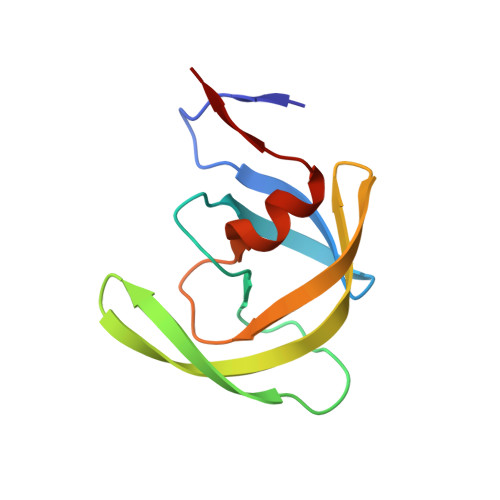Extreme Multidrug Resistant HIV-1 Protease with 20 Mutations Is Resistant to Novel Protease Inhibitors with P1'-Pyrrolidinone or P2-Tris-tetrahydrofuran.
Agniswamy, J., Shen, C.H., Wang, Y.F., Ghosh, A.K., Rao, K.V., Xu, C.X., Sayer, J.M., Louis, J.M., Weber, I.T.(2013) J Med Chem 56: 4017-4027
- PubMed: 23590295
- DOI: https://doi.org/10.1021/jm400231v
- Primary Citation of Related Structures:
4J54, 4J55, 4J5J - PubMed Abstract:
Extreme drug resistant mutant of HIV-1 protease (PR) bearing 20 mutations (PR20) has been studied with the clinical inhibitor amprenavir (1) and two potent antiviral investigational inhibitors GRL-02031 (2) and GRL-0519 (3). Clinical inhibitors are >1000-fold less active on PR20 than on wild-type enzyme, which is consistent with dissociation constants (KL) from isothermal titration calorimetry of 40 nM for 3, 178 nM for amprenavir, and 960 nM for 2. High resolution crystal structures of PR20-inhibitor complexes revealed altered interactions compared with the corresponding wild-type PR complexes in agreement with relative inhibition. Amprenavir lacks interactions due to PR20 mutations in the S2/S2' subsites relative to PR. Inhibitors 2 and 3 lose interactions with Arg8' in PR20 relative to the wild-type enzyme because Arg8' shifts to interact with mutated L10F side chain. Overall, inhibitor 3 compares favorably with darunavir in affinity for PR20 and shows promise for further development.
Organizational Affiliation:
Department of Biology, Molecular Basis of Disease Program, Georgia State University, Atlanta, Georgia 30303, USA.
















